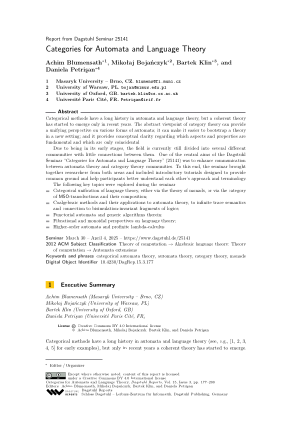Categories for Automata and Language Theory (Dagstuhl Seminar 25141)
Authors Achim Blumensath, Mikołaj Bojańczyk, Bartek Klin, Daniela Petrişan and all authors of the abstracts in this report
-
Part of:
Issue:
Dagstuhl Reports, Volume 15, Issue 3
Part of: Volume: Dagstuhl Reports, Volume 15
Part of: Journal: Dagstuhl Reports (DagRep) - License:
 Creative Commons Attribution 4.0 International license
Creative Commons Attribution 4.0 International license
- Publication Date: 2025-10-10
File

PDF
DagRep.15.3.177.pdf
- Filesize: 2.53 MB
- 24 pages
Document Identifiers
Subject Classification
ACM Subject Classification
- Theory of computation → Algebraic language theory
- Theory of computation → Automata extensions
Keywords
- categorical automata theory
- automata theory
- category theory
- monads
Metrics
- Access Statistics
-
Total Accesses (updated on a weekly basis)
0PDF Downloads0Metadata Views
Abstract
Categorical methods have a long history in automata and language theory, but a coherent theory has started to emerge only in recent years. The abstract viewpoint of category theory can provide a unifying perspective on various forms of automata; it can make it easier to bootstrap a theory in a new setting; and it provides conceptual clarity regarding which aspects and properties are fundamental and which are only coincidental. Due to being in its early stages, the field is currently still divided into several different communities with little connections between them. One of the central aims of the Dagstuhl Seminar "Categories for Automata and Language Theory" (25141) was to enhance communication between automata theory and category theory communities. To this end, the seminar brought together researchers from both areas and included introductory tutorials designed to provide common ground and help participants better understand each other’s approach and terminology. The following key topics were explored during the seminar: - Categorical unification of language theory, either via the theory of monads, or via the category of MSO-transductions and their composition; - Coalgebraic methods and their applications to automata theory, to infinite trace semantics and connection to bisimulation-invariant fragments of logics; - Functorial automata and generic algorithms therein; - Fibrational and monoidal perspectives on language theory; - Higher-order automata and profinite lambda-calculus.
Cite As Get BibTex
Achim Blumensath, Mikołaj Bojańczyk, Bartek Klin, and Daniela Petrişan. Categories for Automata and Language Theory (Dagstuhl Seminar 25141). In Dagstuhl Reports, Volume 15, Issue 3, pp. 177-200, Schloss Dagstuhl – Leibniz-Zentrum für Informatik (2025)
https://doi.org/10.4230/DagRep.15.3.177
BibTex
@Article{blumensath_et_al:DagRep.15.3.177,
author = {Blumensath, Achim and Boja\'{n}czyk, Miko{\l}aj and Klin, Bartek and Petri\c{s}an, Daniela},
title = {{Categories for Automata and Language Theory (Dagstuhl Seminar 25141)}},
pages = {177--200},
journal = {Dagstuhl Reports},
ISSN = {2192-5283},
year = {2025},
volume = {15},
number = {3},
editor = {Blumensath, Achim and Boja\'{n}czyk, Miko{\l}aj and Klin, Bartek and Petri\c{s}an, Daniela},
publisher = {Schloss Dagstuhl -- Leibniz-Zentrum f{\"u}r Informatik},
address = {Dagstuhl, Germany},
URL = {https://drops.dagstuhl.de/entities/document/10.4230/DagRep.15.3.177},
URN = {urn:nbn:de:0030-drops-248949},
doi = {10.4230/DagRep.15.3.177},
annote = {Keywords: categorical automata theory, automata theory, category theory, monads}
}
